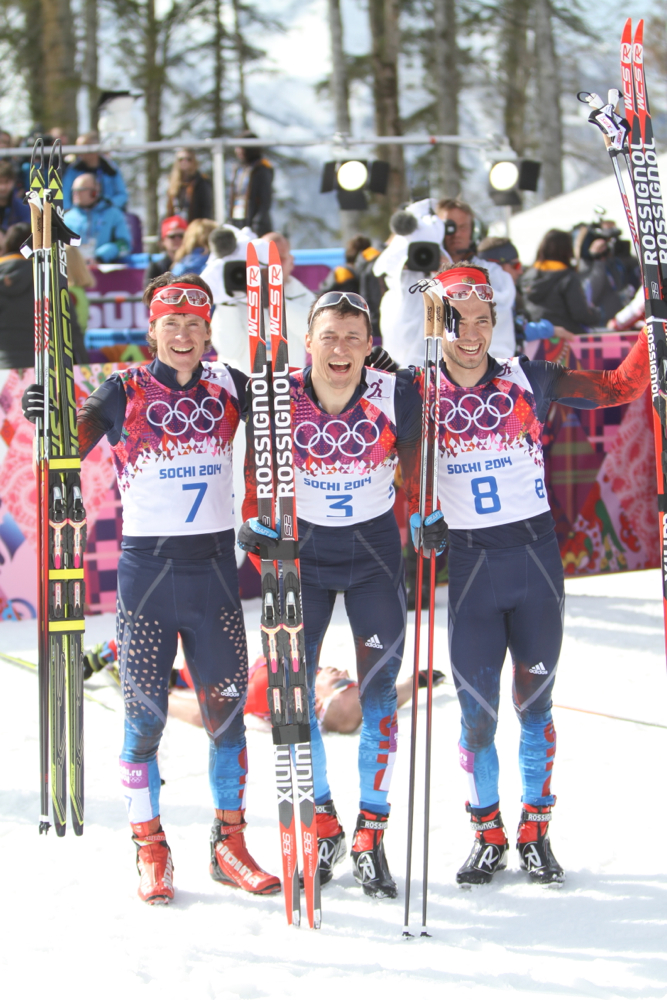
The International Ski Federation (FIS) has provisionally suspended six Russian cross-country skiers implicated in doping violations at the 2014 Olympics. Two dozen more cases are proceeding without any suspensions to date. Meanwhile, Russia has given back the right to host FIS Cross-Country World Cup Finals in Tyumen.
Six Suspensions
The skiers are among 28 athletes being investigated by the International Olympic Committee (IOC). The cases were brought to light in the McLaren report, an investigation on behalf of the World Anti-Doping Agency (WADA).
“As a result of the current circumstances whereby the FIS competition season is in full swing and the competitions and sporting accomplishments of the athletes are being undermined by the shadow of the McLaren Investigation Report, the IOC has empowered FIS to undertake follow-up actions in its own competence with the alleged anti-doping rule violations that took place during the period of the Sochi 2014 Games,” FIS noted in their press release.
The IOC has jurisdiction over all anti-doping activity at Olympic Games. That means that any samples collected between Jan. 31 and Feb. 22, 2014 which tested positive for banned substances or showed signs of tampering are the responsibility of the IOC rather than a relevant international sports federation like FIS.
FIS cannot release the names of the athletes until disciplinary proceedings – in this case handled by the IOC – are complete.
If the names are to be released, FIS “leaves it to the athletes and the Russian Ski Association to do so.”
Update: multiple sources, including Russian website championat.com, are reporting that the six athletes are Alexander Legkov, Maxim Vylegzhanin, Evgeny Belov, Alexei Petukhov, Julia Ivanova, and Evgnenia Shapovalova.
The 28 cases apparently involve sample bottles which were tampered with.
“Prof. McLaren had investigated 95 samples of Russian athletes provided to him by the IOC,” the IOC wrote in their press release. “They led to the 28 athletes with evidence of sample manipulation. They have now been repatriated back to the Lausanne Anti-Doping Laboratory, and re-analysis has already begun on these samples looking for any Adverse Analytical Findings (AAFs). At this point in time, these 28 new cases are not AAFs, like a positive doping test. However, the manipulation of the samples themselves could lead to an Anti-Doping Rule Violation and sanctions.”
Elena Vyalbe, President of the Cross-Country Ski Federation of Russia, does not believe that athletes were doping. Instead, she blames the suspicious marks on sample bottles on Grigory Rodchenkov, the former Moscow anti-doping laboratory director. Rodchenkov fled Russia and became a whistleblower to the New York Times and WADA.
“I’m sure, I know that my athletes did not take anything,” Vyalbe told R-Sport, according to a translation. “We will insist on this fact… Athletes have no access to the samples after delivery. How could they have inflicted damage on [the bottles]? The athletes themselves have not done this, and the federation also has nothing to do with this. It’s more likely just to dirty tricks by Rodchenkov… we very much hope for a fair conclusion of the investigation.”
28 Outstanding Cases
The McLaren report listed at least 34 skiers who were involved in doping violations. However, the majority of the cases did not occur at the Olympics.
The non-Olympic cases include:
- a female skier tested positive to EPO and was apparently “quarantined”;
- a nordic combined skier tested positive for the banned heart medication trimetazidine, but the test was reported as negative to WADA;
- a female skier used exogenous testosterone and was “quarantined”;
- another female skier had high testosterone, but the test was nevertheless reported to WADA as being negative;
- and a male skier tested positive for phthalates, plasticizers used to soften blood bags, but the test was reported as negative to WADA.
There is no word so far on how FIS is investigating the non-Olympic cases, or a timeline of when provisional suspensions for those athletes may arrive, if appropriate.
World Cup Finals Out of Russia
Meanwhile, the Russian Ski Association has given back the World Cup Finals series set for Tyumen, Russia, in March. FIS will now have to decide where to relocate the races.
“The findings in the McLaren Report have seriously damaged the integrity of sport and we are determined to ensure the necessary measures are undertaken to punish the offences,” FIS President Gian Franco Kasper said in the FIS press release. “We will work together with the Russian Ski Association to rehabilitate the Russian cross-country skiing community and we sincerely count on their commitment to clean sport.”
Chelsea Little
Chelsea Little is FasterSkier's Editor-At-Large. A former racer at Ford Sayre, Dartmouth College and the Craftsbury Green Racing Project, she is a PhD candidate in aquatic ecology in the @Altermatt_lab at Eawag, the Swiss Federal Institute of Aquatic Science and Technology in Zurich, Switzerland. You can follow her on twitter @ChelskiLittle.



